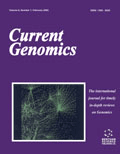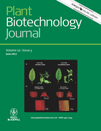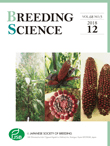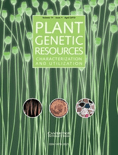
MOLECULAR BREEDING
Scope & Guideline
Transforming Agriculture with Innovative Molecular Insights
Introduction
Aims and Scopes
- Genetic Mapping and QTL Analysis:
Research often involves identifying quantitative trait loci (QTLs) associated with important agronomic traits, such as yield, disease resistance, and stress tolerance, using various mapping techniques. - Genomic Selection and Breeding Techniques:
The journal publishes studies on the application of genomic selection, marker-assisted breeding, and CRISPR/Cas9 technology to enhance crop traits and accelerate breeding processes. - Trait Improvement and Functional Genomics:
There is a strong focus on functional genomics to understand the molecular basis of traits, including nutritional quality, abiotic stress tolerance, and disease resistance. - Diversity and Population Genomics:
Research highlights the genetic diversity within and among crop species, assessing its implications for breeding programs and crop improvement strategies. - Plant Biotechnology Applications:
The journal also covers advancements in biotechnology, including the development of transgenic plants and the application of novel breeding technologies for crop enhancement.
Trending and Emerging
- Multi-Omics Approaches:
There is a growing trend in utilizing multi-omics strategies (genomics, transcriptomics, proteomics) to gain comprehensive insights into plant biology and enhance breeding outcomes. - Sustainable and Resilient Crop Breeding:
Research focusing on developing crops that can withstand climate change and environmental stresses is increasingly prominent, highlighting the need for sustainability in agriculture. - Precision Breeding and Gene Editing:
The use of advanced gene editing technologies, such as CRISPR/Cas9, is on the rise, with studies demonstrating their potential to create novel traits and enhance crop performance. - Nutritional Quality Improvement:
There is an emerging emphasis on improving the nutritional profile of crops, addressing global food security and health issues through enhanced crop quality. - Integration of Artificial Intelligence in Breeding:
The incorporation of AI and machine learning techniques for predicting breeding outcomes and optimizing breeding strategies is becoming a significant trend, reflecting technological advancements.
Declining or Waning
- Conventional Breeding Approaches:
There is a noticeable reduction in papers focusing solely on traditional breeding methods, as the emphasis shifts toward molecular and genomic techniques that offer more precise and faster results. - Single Trait Focus:
Research that targets single traits without considering the multi-trait interactions is less frequently published, as there is a growing recognition of the importance of holistic approaches to breeding. - Basic Genetic Studies:
While foundational genetic studies remain important, there is less focus on purely theoretical or basic genetic concepts in favor of applied research with direct implications for crop improvement. - Studies on Non-Crop Species:
The journal has shifted its focus away from research on non-crop species, favoring studies that have direct applications in agricultural crops and food security.
Similar Journals

CURRENT GENOMICS
Illuminating the path of genetic discovery.CURRENT GENOMICS is a premier journal published by Bentham Science Publishers that focuses on the expansive field of genomics, including both clinical and molecular genetics. With the ISSN 1389-2029 and E-ISSN 1875-5488, this esteemed journal has been disseminating significant scientific insights since its inception in 2000 and continues to contribute to the field through 2024. Based in the United Arab Emirates, CURRENT GENOMICS boasts a Q3 ranking in both the genetics and clinical genetics categories for 2023, reflecting its growing impact in the scientific community. Although not an open-access journal, it provides valuable content that supports researchers and professionals in navigating the complexities of genetic research and its applications. By publishing original research articles, reviews, and case studies, CURRENT GENOMICS aims to foster a deeper understanding of genomic science and its implications for medicine, thus playing a critical role in the advancement of genetics and biomedical research.

Tree Genetics & Genomes
Elevating tree genetics research for global impact.Tree Genetics & Genomes is a premier academic journal published by Springer Heidelberg, dedicated to advancing the field of tree genetics and genomics. Since its inception in 2005, this journal has played a crucial role in disseminating high-quality research that addresses critical questions in tree biology, horticulture, and forestry. The journal is highly regarded within the academic community, as evidenced by its impressive Q1 rankings in both Forestry and Horticulture categories for 2023 and a substantial presence in key genetic research areas. Furthermore, its Scopus rankings affirm its influence across disciplines, ranking among the top journals in Agricultural and Biological Sciences. Although currently not an open-access publication, it aims to provide authors and readers with a platform to share innovative findings and insights that shape sustainable practices in tree planting and management. With a commitment to fostering knowledge in the genetic and genomic analysis of trees, Tree Genetics & Genomes is an essential resource for researchers, professionals, and students alike, contributing to the global understanding of tree biology and its environmental significance.

PLANT BIOTECHNOLOGY JOURNAL
Catalyzing breakthroughs in agricultural biotechnology.Plant Biotechnology Journal, published by Wiley, is a premier open-access platform dedicated to advancing the field of plant biotechnology. Since its inception in 2003, this journal has played a pivotal role in disseminating high-quality research that enhances our understanding of plant genomics, biochemistry, and molecular biology. With an impressive impact factor and a prominent position in Q1 quartiles across Agronomy, Crop Science, Biotechnology, and Plant Science, it ranks among the top journals globally, reflecting its significant influence in the agricultural and biological sciences. Researchers and professionals can access cutting-edge studies and reviews that facilitate innovation in sustainable crop production and biotechnology applications. The journal's transition to an open access model since 2016 has further amplified its reach, ensuring that vital research is available to a global audience, promoting collaboration and knowledge sharing within the scientific community.

BREEDING SCIENCE
Driving Research for a Sustainable Agricultural FutureBREEDING SCIENCE is a premier journal published by the Japanese Society of Breeding, dedicated to the advancement of knowledge in the disciplines of agronomy, plant science, and genetics. Established in 1993, this influential publication has consistently contributed to the global research community, showcasing high-quality studies that intersect innovative breeding techniques with pressing agricultural challenges. With an esteemed Scopus rank placing it in the top quartile of Agronomy and Crop Science and the second quartile in Plant Science, BREEDING SCIENCE is essential reading for researchers, professionals, and students alike. The journal's reach and rigor are evidenced by its significant presence in leading academic databases, providing insights and advancements that are critical for improved crop production and sustainable practices. Although it does not currently offer open access options, the depth and relevance of its content ensure that it remains a vital resource for those committed to exploring the evolution and impact of breeding science. For further information, readers are encouraged to connect directly with the journal via its administrative office located at the University of Tokyo's Graduate School of Agricultural and Life Sciences.

Tropical Plant Biology
Advancing Knowledge in Tropical EcosystemsTropical Plant Biology is a premier academic journal published by Springer, dedicated to advancing the understanding of tropical plants and their ecological significance. With an ISSN of 1935-9756 and an E-ISSN of 1935-9764, this journal serves as a vital platform for researchers, professionals, and students focused on the fields of Genetics and Plant Science. Notably recognized in 2023 as a Q2 journal in Plant Science and Q3 in Genetics, it ranks 171st out of 516 in Agricultural and Biological Sciences and 227th out of 347 in Genetics according to Scopus. The journal encompasses a diverse range of topics, offering insights into tropical plant biology, ecology, conservation, and biodiversity. Although it does not currently operate under an open-access model, it remains an essential resource for anyone passionate about tropical ecosystems and their intricate relationships. With contributions spanning from 2009 to 2024, Tropical Plant Biology continues to foster scholarly discourse and innovation in the field.

INDIAN JOURNAL OF GENETICS AND PLANT BREEDING
Unlocking Genetic Potential for Future HarvestsIndian Journal of Genetics and Plant Breeding, ISSN 0019-5200, published by the Indian Society of Genetics and Plant Breeding, serves as a pivotal platform for research in the fields of genetics and plant breeding. Based in India, this journal provides valuable insights into the latest developments, methodologies, and findings that drive innovation and enhance the agricultural landscape. With a convergence period extending from 2008 to 2024, this journal maintains a strong focus on advancing our understanding of genetic mechanisms in plants, contributing significantly to both academic circles and practical applications in agriculture. Although presently ranked in the fourth quartile for Genetics and the third quartile for Plant Science, the journal aims to elevate its impact factor and enhance visibility among research communities through rigorous peer-reviewed articles. Published in both print and online formats, the journal is accessible to a global audience and emphasizes the importance of open communication in fostering scientific advancements. Researchers, professionals, and students alike will find this journal an essential resource for staying abreast of trends and breakthroughs in genetic research and plant breeding.

Plant Genetic Resources-Characterization and Utilization
Exploring Genetic Treasures for Tomorrow's CropsPlant Genetic Resources-Characterization and Utilization, published by Cambridge University Press, is an esteemed journal in the field of plant science, particularly focusing on the genetic resources crucial for agriculture and crop improvement. With an ISSN of 1479-2621 and an E-ISSN of 1479-263X, this journal serves as a vital platform for researchers aiming to advance the understanding of genetic variation and its applications in plant breeding and conservation. The journal boasts an impressive positioning within its categories, achieving Q2 in Agronomy and Crop Science, Q4 in Genetics, and Q3 in Plant Science as of 2023, which reflects its commitment to publishing high-quality research. Although primarily subscription-based, the journal is accessible to institutions and individuals seeking to stay at the forefront of innovations in plant genetic resources. Researchers, professionals, and students alike will find valuable insights into the latest methodologies, findings, and implications for sustainable agriculture and ecosystem management in its pages. As a key resource for advancing knowledge and practical applications in its field, Plant Genetic Resources-Characterization and Utilization continues to significantly contribute to the scientific community and the understanding of plant biodiversity.

JOURNAL OF PLANT BIOCHEMISTRY AND BIOTECHNOLOGY
Cultivating Knowledge in Plant Biochemistry and BiotechnologyJOURNAL OF PLANT BIOCHEMISTRY AND BIOTECHNOLOGY, published by SPRINGER INDIA, is a leading publication dedicated to advancing research in the fields of plant biochemistry, biotechnology, agronomy, and crop science. With an ISSN of 0971-7811 and E-ISSN 0974-1275, the journal encompasses a wide range of studies aimed at enhancing our understanding of plant biological processes and their applications in agriculture and biotechnology. It has achieved a noteworthy Q2 ranking in Agronomy and Crop Science and Plant Science, as well as a Q3 ranking in Biotechnology, reflecting its quality and relevance in contemporary research. Notably, the journal ranks #166 in Plant Science and #133 in Agronomy, both falling in the top 67th percentile. With a rich history spanning from 1992 to 2024, the journal is committed to providing open access to innovative research findings that bridge the gap between laboratory discoveries and their practical applications in sustainable agriculture. Researchers, professionals, and students will find a wealth of knowledge and inspiration to advance their work in the dynamic field of plant sciences at this esteemed journal.

GENOME
Shaping the Landscape of Molecular BiologyGENOME is a leading peer-reviewed journal published by Canadian Science Publishing, dedicated to advancing the field of genetics, biotechnology, and molecular biology. With a strong commitment to disseminating high-quality research, GENOME has earned a reputable spot in the academic community, boasting a Q2 classification in Biotechnology and Medicine (miscellaneous), and a Q3 rank in Genetics and Molecular Biology for 2023. The journal, identified by its ISSN 0831-2796 and E-ISSN 1480-3321, publishes innovative studies that span from 1987 to 2024, ensuring a rich historical context while addressing contemporary challenges in the field. Researchers and professionals are encouraged to contribute and engage with content that shapes the landscape of genetic research. Although the journal does not currently provide open access, it remains a vital resource for those committed to the exploration of genomic sciences, making it an essential read for both seasoned researchers and students alike.

POTATO RESEARCH
Uncovering the potential of the humble potato.POTATO RESEARCH is a prestigious journal dedicated to advancing the scientific understanding of potato cultivation and its wider implications in the fields of agronomy, crop science, and food science. Published by Springer in the Netherlands, this journal boasts an impressive impact factor and ranks in the Q2 category for both Agronomy and Crop Science, as well as Food Science in 2023, affirming its significant contribution to these disciplines. With over five decades of research converged from 1970 to 2024, POTATO RESEARCH serves as a vital platform for researchers, professionals, and students interested in the latest findings and innovations that affect potato production and processing. Although it is not an open-access journal, it remains a crucial resource for those dedicated to enhancing agricultural sustainability and food security. For inquiries or submission details, please refer to their office located at Van Godewijckstraat 30, 3311 GZ Dordrecht, Netherlands.